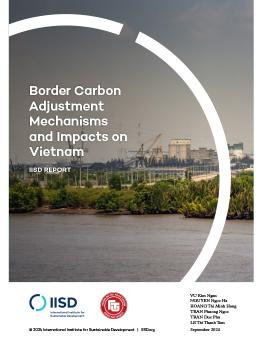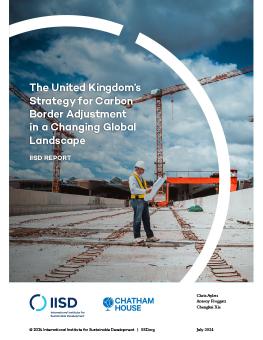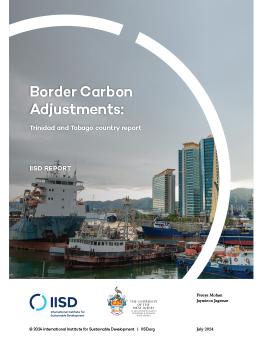Climate Change, the Natural Environment, and the Green Transition
IISD is driving change at the intersection of trade, climate change, and the natural environment. From tackling urgent challenges like climate resilience or plastic pollution to fostering green market growth and ramping up industrial decarbonization efforts, our research informs better policies for a sustainable future.
In a world grappling with the urgency of meeting the 1.5°C Paris targets and combatting environmental crises, the international trade community cannot afford to be passive. Better-designed policies and closer integration of trade and environmental agendas can help mitigate climate change, bolster resilience, and foster the growth of a greener global market.
At IISD, we have a longstanding commitment to bridging the gap between trade policy and environmental imperatives. Our research delves into the role of trade policy and its instruments to deliver on broader sustainability goals like the energy transition and climate-resilient development. From driving decarbonization in industrial sectors to promoting circularity and sustainable production, our work aims to forge pathways toward a greener, more resilient future.
Current Focus Areas:
-
Trade and decarbonization
As governments worldwide intensify efforts to address industrial decarbonization, we provide expert insights and technical assistance in areas such as border carbon adjustments (BCAs), green industrial policy, and fossil fuel subsidy reform at the World Trade Organization. Our longstanding engagement in these domains aims to inform policy discussions, foster international cooperation, and drive effective action toward a sustainable future.
-
Climate resilience
Climate resilience is a pressing challenge for developing countries that have often contributed very little to the causes of such drastic changes. IISD aids governments by providing vital research and technical assistance that bridges trade policy and resilience efforts, enabling more integrated decision-making to address this long-overlooked intersection.
-
Plastics
Governments globally are combating plastic pollution by curbing the use of plastics and promoting circularity. Yet, fragmented efforts fall short of effective action. IISD aids governments with evidence-based support, evaluating the impact of their plastic policies through an international trade lens and supporting those thinking of effective paths to global cooperation.
Analysis

Addressing Carbon Leakage: A toolkit
As countries adopt ambitious climate policies, this toolkit examines strategies to prevent carbon leakage—when production and emissions shift to nations with weaker climate policies—and explores the trade-offs of each approach.

Understanding Border Carbon Adjustments (BCAs)
As more countries consider adopting Border Carbon Adjustments, their design will determine their impact. In this video, IISD expert Aaron Cosbey explores these issues, highlighting the need for international cooperation.

Why Trade Matters in the Plastic–Pollution Treaty Negotiations
The global push to end plastic pollution by 2040 highlights the critical intersection of trade and environmental action, with upcoming INC-5 negotiations focusing on reducing plastic production, consumption, and waste within a fair and effective international framework.
Research and publications

Border Carbon Adjustment Mechanisms and Impacts on Vietnam
This report consolidates, analyzes, and presents views and perspectives of stakeholders from Vietnam on border carbon adjustment (BCA) schemes to contribute to the global debate on BCA good practices.

The United Kingdom's Strategy for Carbon Border Adjustment in a Changing Global Landscape
This report consolidates, analyzes, and presents views and perspectives of United Kingdom stakeholders on its proposed Carbon Border Adjustment Mechanism (CBAM) to contribute to the global debate on international principles and best practices for national border carbon adjustment schemes.

Border Carbon Adjustments: Trinidad and Tobago country report
This report consolidates, analyzes, and presents views and perspectives of stakeholders from Trinidad and Tobago on border carbon adjustment (BCA) schemes to contribute to the global debate on BCA good practices.
Recent events
COP 29 | Who’s Afraid of Carbon Leakage?
This COP 29 side event addressed the implications of carbon leakage and border carbon adjustments (BCAs) for balancing climate action and economic competitiveness.
Trade Policy in Support of Climate Change Adaptation and Resilient Development
This T+S Hub session explored how trade and policy can aid climate change adaptation in developing countries, featuring insights from experts and policymakers.
A Brave New World of Border Carbon Adjustments
This T+S Hub session gathered experts, policymakers, and industry leaders to discuss the challenges, opportunities, and implications of BCAs in global decarbonization efforts, focusing on priorities for international cooperation.
Project team

Nathalie Bernasconi-Osterwalder
Vice-President, Global Strategies and Managing Director, Europe

Alice Tipping
Director, Trade and Sustainable Development

Ieva Baršauskaitė
Lead, Trade and the Green Transition

Antoine Bonnet
Policy Advisor

Aaron Cosbey
Senior Associate

Darcie Doan
Senior Specialist, Trade and Climate

Tristan Irschlinger
Senior Policy Advisor, Fisheries Subsidies

Rashmi Jose
Senior Policy Advisor

Rashid S. Kaukab
Senior Specialist, Trade and Sustainable Development

Florencia Sarmiento
Policy Advisor

Maria Barral
Communications Officer
Latest
You might also be interested in
Fisheries Subsidies
IISD works to support the WTO negotiations to end harmful fisheries subsidies.
Fair and Sustainable Trade in Food and Agriculture
IISD conducts research and facilitates dialogue to help bring about trade rules that promote equitable and sustainable international trade in food and agricultural products.
Trade Knowledge Sharing
The nexus between trade and sustainable development is complex and multi-faceted, and ensuring that the conversation around these issues is active, engaged, and informed is vital.



